Expert Tips for Choosing the Right Dentists Eugene for Your Dental Health
Expert Tips for Choosing the Right Dentists Eugene for Your Dental Health
Blog Article
Discover Common Dental Issues That Dentists Can Treat Efficiently
Dental health is an essential facet of general health, yet common issues such as dental caries, gum tissue disease, dental cavity, tooth sensitivity, and misaligned teeth often go neglected. Each of these conditions can significantly impact not just dental wellness but additionally daily convenience and confidence. Innovations in oral care have actually made it possible for dental experts to attend to these issues successfully through different treatments. From routine cleanings and dental fillings to orthodontic interventions, the options available today are both thorough and obtainable. What are the certain treatments offered, and exactly how can they bring back optimum oral health?
Cavities
They occur when the enamel, the tough outer surface area of the teeth, is eroded by acids generated by germs in the mouth. These germs flourish on sugars and starches from food and drinks, producing a sticky movie called plaque that sticks to the teeth.

Safety nets are important in combating cavities. These consist of maintaining excellent oral health practices such as routine brushing with fluoride toothpaste, flossing, lowering sugar consumption, and going to regular oral gos to. By sticking to these techniques, individuals can dramatically decrease their danger of establishing cavities and maintain optimal oral health.
Gum Illness
Periodontal disease, additionally called gum illness, is a widespread condition that affects the cells bordering and supporting the teeth. It mainly happens due to the build-up of plaque, a sticky film of microorganisms that bases on the teeth. If not removed with normal cleaning and flossing, plaque can set into tartar, which can just be removed by a dental specialist.
There are two primary phases of periodontal condition: gingivitis and periodontitis. Gingivitis is the preliminary, milder form, defined by red, swollen periodontals that may hemorrhage conveniently. At this stage, the problem is typically reversible with correct oral hygiene and expert oral cleansings. If left untreated, gingivitis can proceed to periodontitis, an extra serious kind that can result in loss of the bone that supports the teeth.
Periodontitis involves much deeper infection and inflammation of the gum tissues, triggering the gum tissues to retreat from the teeth and create pockets that can come to be contaminated. Therapy for periodontitis typically includes scaling and origin planing, a deep-cleaning procedure to remove tartar and microorganisms from beneath the gums. In advanced instances, surgical interventions might be needed to restore gum and bone health. Routine oral check-ups are crucial for early discovery and efficient administration of gum tissue illness.
Dental Cavity
Tooth decay, a prevalent oral problem, materializes when the tough surface of the tooth, understood as enamel, is harmed by acids created by bacteria in plaque. This process begins when sugary and starchy foods are eaten, giving a reproduction ground for microorganisms. These microorganisms metabolize the sugars to produce acids, which ultimately deteriorate the enamel, leading to tooth cavities.
At first, dental caries might be asymptomatic, but as it advances, it can cause visible holes or pits in the teeth, toothache, and level of sensitivity to hot, chilly, or pleasant materials (eugene dentist). If left neglected, the decay can pass through deeper layers of the tooth, getting to the dentin and ultimately the pulp, creating serious pain and potentially leading to abscesses or infections
Very early treatment is crucial for optimal results, making regular oral examinations vital for identifying and addressing imbalance concerns quickly. With individualized therapy plans, dental experts can effectively restore both the functionality and look of a patient's smile.
Verdict
In summary, attending to common oral troubles such as cavities, gum disease, dental caries, tooth Homepage sensitivity, and misaligned teeth is crucial for preserving oral health and performance. Dentists are outfitted to detect and deal with these concerns efficiently with various interventions, including fillings, cleansings, orthodontics, and precautionary care. Suitable and prompt therapy can mitigate the threats connected with these oral problems, thereby improving total oral wellness and quality of life.
Oral health and wellness is a crucial aspect of general health, yet typical issues such as cavities, periodontal disease, tooth degeneration, tooth sensitivity, and misaligned teeth commonly go neglected.Tooth degeneration, a prevalent dental problem, shows up when the difficult surface area of the tooth, understood as enamel, is harmed by acids produced by bacteria in plaque. Precautionary measures such as normal dental examinations, good oral health practices, and a balanced diet are important in reducing the threat of tooth decay.
Typical factors consist of enamel erosion due to aggressive cleaning, acidic food consumption, or oral problems such as gum tissue economic crisis and tooth decay.In summary, attending to common oral issues such as tooth cavities, periodontal condition, tooth degeneration, tooth level of sensitivity, and misaligned teeth is essential for maintaining dental linked here health and performance.
Report this page